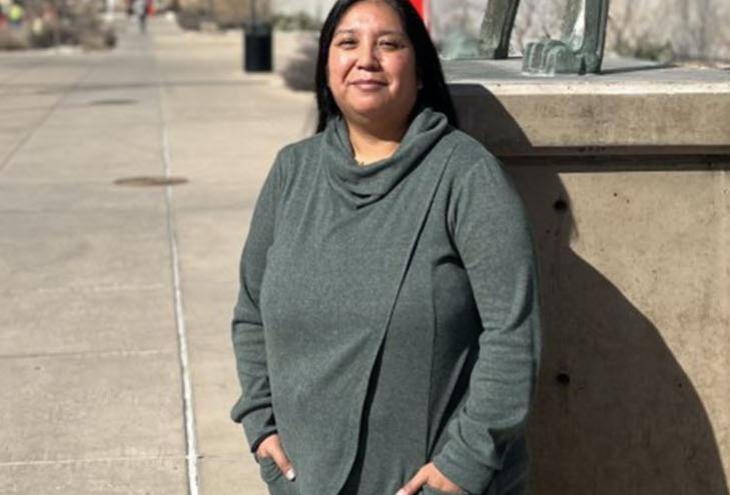Working on water resource and environmental issues, often in support of Native communities, is at the heart of what drives Dr. Lani Tsinnajinnie, Diné. Now an assistant professor in the Department of Community and Regional Planning at the University of New Mexico (UNM), she grew up in the remote community of Na’Neelzhiin, N.M., where she saw firsthand the need for clean drinking water for rural residents. “Although the house I grew up in had running water, nearly half the households in Na’Neelzhiin did not,” she says. “As a college student, I would attend chapter meetings where community members would plead with our chapter leaders and ask them when the infrastructure would be provided to bring running water to their homes.”
Supporting Indigenous communities in developing plans for secure access to water is Dr. Tsinnajinnie’s ultimate career goal. “One way I’m trying to achieve this is by helping to build the expertise of community members. I teach graduate and undergraduate students about underlying environmental and water resource issues as well as current and developing strategies to address them,” she explains. “Several of my students are Native and have goals of addressing these issues in their home communities.”
Dr. Tsinnajinnie’s interests are wide ranging. In areas like education, climate change, and water resource and watershed planning, she collaborates in several research projects — projects that engage with Native schools and communities to develop strategies. “I love being able to work with others who care about addressing water issues facing communities,” she says.
Her background makes Dr. Tsinnajinnie an ideal fit for teaming with colleagues on research initiatives as well as teaching and mentoring students. At UNM she earned a BA in Native American Studies, a BS in environmental science, and a master of water resources (MWR) with a concentration in hydroscience. She went on to earn a PhD in hydrology at New Mexico Tech.
Most of Dr. Tsinnajinnie’s research has focused on the interactions of groundwater and surface water resources in mountainous regions and the impacts of climate change on those resources. Her work has concentrated on the Chuska Mountains in the center of the Navajo Nation along the Arizona and New Mexico borders. Since 2009, she has collaborated with the Navajo Nation Water Management Branch investigating how snow, groundwater, and streamflow interact in those mountain watersheds. “We are looking at how these interactions might change or are changing,” she says. “This research has been used to support how the Navajo Nation monitors snowpack as well as how surrounding communities approach watershed planning.”
Her involvement with AISES, which she joined as an undergraduate, led her to the AISES Lighting the Pathway to Faculty Careers for Natives in STEM Program. The program provides career guidance, support, and mentoring to students who want to teach at the college level. “The program opened my eyes to the possibility of becoming faculty,” she explains. “During the final year of my doctorate program, I applied for the position I currently have at UNM. It felt like a good fit, and the idea of a faculty position at my alma mater — and close to my home community and family — was really enticing.”
Guidance from her family has played a significant role for Dr. Tsinnajinnie. Her father’s family lived nearby, and her grandmother, Iola, was an educator and community leader in Na’Neelzhiin. “She instilled the importance of education in my dad, aunts, uncles, siblings, and cousins,” says Dr. Tsinnajinnie, whose mother grew up in Hawaii, where much of her family lives.
When it came to career choices, she says her older sister and brother have been her most supportive mentors. Her sister earned a PhD in education at UNM, where she teaches Native American studies. Dr. Tsinnajinnie’s brother earned a PhD in mathematics from the University of Arizona and works for an education consulting firm. “I’ve always looked up to both of them,” she says. “They have helped me navigate my educational and professional journeys.”
For Dr. Tsinnajinnie, her academic career has found many pluses. “Being able to work with motivated students gives me a lot of energy and inspiration to work on water and environmental issues that can sometimes be discouraging,” she explains. “I also enjoy the collegial atmosphere among Native and water-focused faculty, as well as working for a university and department that value collaboration and engagement, particularly with Indigenous communities in New Mexico.”













